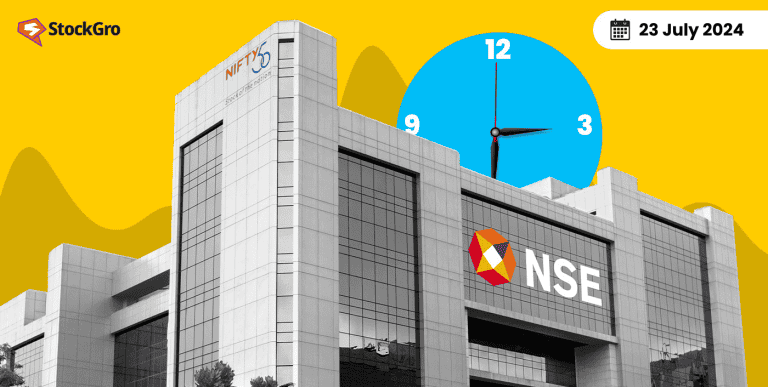
The Union Budget 2024 has plans to boost India’s economic growth by investing heavily in major sectors such as agriculture, infrastructure, manufacturing, IT and finance. These allocations are aimed at innovation, improving infrastructure and financial inclusion which guarantee sectoral growth that will impact positively on the stock market and big companies.
This article seeks to highlight key aspects of the Union Budget 2024, including its allocations, the effect of the budget on the stock market, analysis of various sectors of the Union Budget and notable companies set to benefit from these fiscal measures.
Understanding how this budget influences the economy and the stock market on Budget Day 2024 can help you make rational choices and strategically position yourself to harness unfolding opportunities.
You may also like: In Nirmala Sitharaman budget 2024: What it means for you
Brief overview of Union Budget
Union Budget, as defined under Article 112 of the Constitution of India, is the annual financial statement. It represents a projection of estimated government receipts and payments for that fiscal year. The budget is a record of the government’s financial transactions in any given fiscal year, that is, from April 1 to March 31.
Also read: Budget surplus: Definition, consequences and calculation
On July 23, 2024, Finance Minister Nirmala Sitharaman presented the Union Budget 2024 in Parliament, stressing poverty alleviation measures aimed at less privileged people. These measures include more expenditure on programs that create employment opportunities and tax reductions for middle-class employees, as outlined in the budget speech.
Here are the key points from the Union Budget 2024-2025:
- Employment & skilling: Five schemes worth ₹2 lakh crore to facilitate employment and skilling of 4.1 crore youth over five years.
- Rural development: Rural development, including infrastructure and rural housing, will receive ₹2.66 lakh crore funding.
- Women & girls: Women and girls targeted schemes have been allocated funds worth more than ₹3 Lakh Crore.
- Urban housing: Investment of ₹10 lakh crore under PM Awas Yojana Urban 2.0 for fulfilling housing requirements of 1 crore urban poor and middle-class families.
- Education & skilling: Education, Employment and Skill development received ₹1.48 lakh crore funding.
Sector-wise budget allocation
Agriculture
The agriculture and allied sectors have received ₹1.52 lakh crore in the Union Budget 2024-25, which is focused on productivity and resilience. Among these are plans to achieve full coverage of farmers and their lands within three years through the implementation of Digital Public Infrastructure (DPI) for agriculture.
This year, a digital crop survey will be done in four hundred districts for Kharif and six crore farmers’ particulars will be included in the registers together with their land details. On top of that, Jan Samarth-based Kisan credit cards will be released in five states.
To attain self-sufficiency, the government wants to raise pulses’ and oilseeds’ production, storage and marketing. This will be achieved through the development of large-scale clusters for vegetable production near major consumption centres thereby promoting Farmer-Producer Organisations (FPOs), Cooperatives and Start-ups.
Infrastructure
Infrastructure development is given a strong priority in the Union Budget of 2024-25. Capital Expenditure has been granted by the Government at ₹11,11,111 crore, which is equal to 3.4% of GDP. The investment is meant to ensure continued strong fiscal support for infrastructure during the next five years, thus encouraging states to give similar support.
Further, long-term interest-free credit amounting to ₹1.5 lakh crore has been allocated for the states to help them allocate their resources.
Public-private partnership (PPP) in infrastructure development is also given a thought in the budget where mechanisms like Public-Private Partnership Appraisal Committee and Viability Gap Funding (VGF) are provided for which contributes much toward supporting such projects that could be financially unviable but socially desirable.
Under the National Monetisation Pipeline (NMP), India is seeking private sector investments for creating new infrastructure with an estimated monetisation potential of ₹6.0 lakh crore over four years. By all means, these initiatives show that the government is determined to take the Indian economy and infrastructural growth forward thereby putting India on rapid progress.
Manufacturing
Substantial focus is placed on manufacturing and MSMEs in the Union Budget 2024-25. There is a major emphasis on labour-intensive manufacturing through a self-financing guarantee fund that will provide guarantee cover of up to ₹100 crore per applicant.
To ensure continued support during stress periods, public sector banks will strengthen their in-house capabilities for assessing MSMEs for credit. Furthermore, under the “Tarun” category, Mudra loan limits have been increased to ₹20 lakh per successful entrepreneur.
Information Technology (IT)
The government of India has included some targeted allocations and reforms in its budget for 2024 to enhance the Indian IT industry. The move means that an amount worth ₹551 crores will be used in India’s AI mission, indicating that it is committed to the development of artificial intelligence. Finally, it also stresses Digital India’s mission to enhance data governance to increase efficacy and transparency.
Among the changes made in taxes was a drop in the TDS rate on e-commerce transactions from 1% to 0.1%, plus the abolition of the equalisation levy on e-commerce, which would reduce cost burdening on online businesses.
Moreover, an integrated technology platform has been introduced to improve regulatory efficiency within the Insolvency and Bankruptcy Code (IBC) ecosystem. These policies also intend to stimulate growth and innovation within the IT sector.
Finance
The Financial Services sector in the country is one of the areas that some of the major proposals in the Union Budget for 2024-25 aim to improve. It will do this by streamlining Foreign Direct Investments (FDIs) and Overseas Investments (OIs) which are a means to lure more foreign investments and foster the internationalisation of the Indian Rupee.
Furthermore, for aircraft financing, ship-leasing, and private equity funds, the International Financial Services Centre (IFSC) needs to devise a new variable capital company structure.
There is also a plan in the budget regarding strengthening debt recovery tribunals as well as attracting investments into IFSC through new incentives. A comprehensive review of income tax laws that aims at simplifying tax rates, enhancing taxpayers’ services, and reducing litigation with expected completion within six months.
Additionally, there are proposed changes in the budget on Capital Gains Taxation to rationalise rates and reduce disputes thereby creating a better investment environment.
Key companies benefiting from budget allocations
Various measures and amendments are included in the Union Budget 2024, which is bringing direct positive impacts on several companies.
Let’s analyse some of the major beneficiaries of these budget allocations, highlighting companies that are poised to gain from the announced reforms and initiatives. Here are the key companies benefiting from the recent budget allocations:
- Solar: Tata Power, Adani Green Energy and Waaree Energies will be beneficiaries of the Solar House Free Electricity Scheme. For instance, after the announcement on July 24, Tata Power’s share price grew over 2% intraday.
- Banking: SBI, Bank of Baroda, Bank of India, Union Bank of India and AU Small Finance Bank will benefit from increased Mudra loan limits. For instance, after the announcement on July 24, Bank of Baroda’s share price grew around 3% intraday.
- Agriculture: Central Depository Services (CDSL), CE Info Systems, Genesys, Kaveri Seeds, and Dhanuka Agritech will gain from digitisation and increased funding for agriculture. For instance, after the announcement on July 24, CE Info Systems’ share price grew over 7% intraday.
- Housing finance: LIC Housing, PNB Housing, Housing And Urban Development Corp (HUDCO) and Aadhar Housing Finance will grow on account of huge investments in housing for the urban poor. For instance, after the announcement on July 24, HUDCO’s share price grew around 9% intraday.
- Jewellery: The reduction in customs duty on gold and silver has led to a surge in jewellery stocks. Companies like Titan and Kalyan Jewellers have seen significant gains. For instance, after the announcement on July 24, Kalyan Jewellers’ share price rose 15% and hit a new record high of ₹633.35.
Also read: Budget deficit: Definition and impact
Bottomline
Union Budget 2024 is an overall strategic roadmap towards stimulating growth, innovation enhancement and infrastructure upgrade of key sectors of the Indian economy. It is a guideline for sustainable economic development through the various segments such as agriculture, infrastructure, manufacturing, IT as well as finance.

